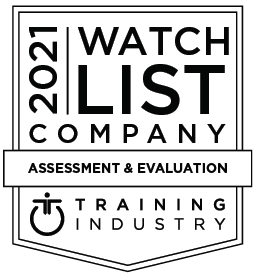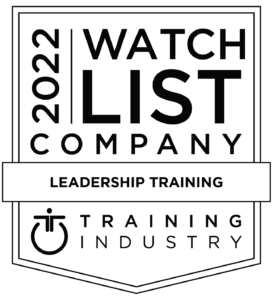In my previous post, I talked about what you can do before a presentation to help you feel less nervous about speaking.
This week, I want to focus on things you can do to reduce anxiety while you’re delivering a presentation. And, I also want to offer an important tip at the end of this post on something you can do if none of this works for you!
Start strong.
Avoid the “it takes me a couple of minutes to warm up” syndrome. Right as you start your presentation, take one small step forward, gesture with both arms, and lock eye contact with someone in the audience for 3-4 seconds.
This recycles your nervous energy immediately and helps you better engage your audience from the get-go.
Move when you speak.
As a general rule, move about 50% of the time during your presentation. Move while looking at someone in the audience and then plant your feet. Repeat—but not too often.
Too much movement looks like nervous pacing. (And be careful not to move into the light of the projector or block your audience’s view of your visuals.)
Moving gives your anxiety—or the adrenaline your body releases during the fight-flight response—an outlet or place to go. The use of movement and natural gestures can work in your favor, and your audience’s, by reducing your nervous energy and keeping the audience more engaged and focused.
Focus on the audience…a lot!
If you stay inside your head, worried about how you’re being perceived, focused on your nervousness, well…you’ll just stay nervous!
If you actually try to see (and not just look at) individuals in the audience, if you make it about them, focus on their need to understand, and just be present for them, it will make it easier on you.
People are often at their best as human beings when they give their attention to others or do for others—it’s the same when giving a presentation.
What about repeated, extreme anxiety during a presentation?
For some people, none of these anxiety-reducing techniques will tame their nerves. The simple truth is, some people release more adrenaline at a much faster rate than others because of the way their bodies are wired to respond when the flight-fight-freeze response kicks in.
If you’re one of these people, you might experience sweating, shaking, nausea, a rapid heart rate, your mind going frequently blank, or extreme fear that is so debilitating it stops you from being able to speak.
In other words, your speaking anxiety may be limiting your career.
If you feel that your anxiety is repeatedly extreme, there’s a non-addictive, non-opiate drug that your doctor can prescribe that might help you. This drug, Propranolol, does not affect mental acuity so people can drive, fly a plane, etc. while using it. A number of people in the performing arts use it to be able to deliver stunning solo performances in front of large audiences.
The drug essentially reduces the flow of adrenaline and other compounds in your body during the fight-flight-freeze response, making your anxiety manageable.
Don’t let speaking anxiety limit your potential.
Most people—regardless of their chosen profession—will have to speak in front of others in order to get their ideas heard or move their careers forward.
Know that it’s completely natural to be nervous—almost everyone is when giving a presentation. If you’ve felt anxious in the past or if you’ve passed on opportunities to share your ideas with others due to your anxiety, I hope the tips I’ve shared in the post and my previous one offer some relief.
Take it from someone who’s spent 30 years as a speaker’s coach. I’ve seen first-hand the tremendous strides people can make when they put these techniques into practice. And, I’ve seen what being able to effectively deliver a presentation can do for their confidence and their careers.
Anxiety often stems from insecurity about what you want to say and how to say it. That’s why hundreds of Fortune 1000 organizations enroll their employees in Mandel’s flagship course, The Extraordinary Presenter™—it dramatically and quickly builds compelling, credible, and confident public speakers. Don’t let anxiety about giving a presentation be an obstacle to your personal growth or your organization’s success.










